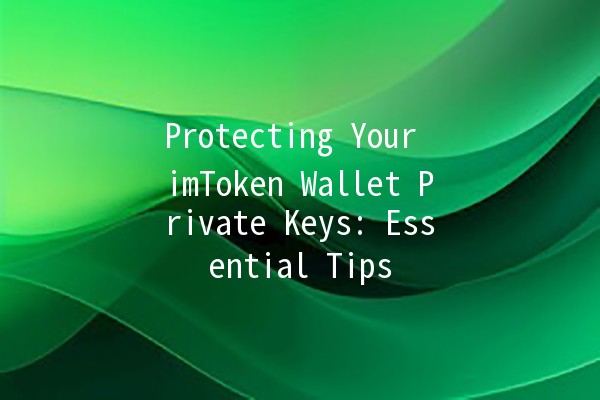In the rapidly evolving world of cryptocurrency, security remains paramount. One essential aspect of that security is protecting your private keys, particularly for users of the imToken wallet. The private key is unique to each wallet and acts as a digital signature that allows you to manage your assets. If it falls into the wrong hands, your crypto assets are at risk. Here, we will explore practical strategies to keep your private keys secure.
Private keys are alphanumeric strings linked to your cryptocurrency wallet. They allow you to access your funds and authorize transactions. Essentially, your private key is the "key" to your digital safe; losing it or letting someone else access it could lead to irreversible loss.
Ownership: Your private key proves ownership of your cryptocurrency. Without access to it, you cannot control or move your assets.
Security: Just like how a bank account requires a PIN for access, a cryptocurrency wallet's private key is vital for securing your digital assets.

Twofactor authentication adds an extra layer of security to your wallet. You can set up 2FA using apps like Google Authenticator or Authy. This means that even if someone manages to get hold of your password, they would still need the second factor (a code generated on your device) to gain access.
Application Example:
Every time you attempt to log into your imToken wallet from a new device, you’ll need to enter a timesensitive code generated through your 2FA app, significantly lowering the risk of unauthorized access.
Storing your private key offline—known as "cold storage"—is one of the most effective ways to protect it. This can be done through hardware wallets or even paper wallets.
Application Example:
Create a paper wallet where you physically write down your private keys and store this paper in a safe place. Alternatively, consider using a hardware wallet like Ledger or Trezor for added security.
Your wallet's security is only as strong as its password. Use long, complex passwords that incorporate numbers, symbols, and a mix of uppercase and lowercase letters. Avoid using easily guessed phrases or repetitive characters.
Application Example:
Use a password manager to generate and store unique passwords for your imToken wallet, rather than relying on memory. This reduces the risk of password fatigue which might lead to the reuse of passwords across platforms.
Phishing attacks remain one of the most common methods used by cybercriminals to steal private keys. Be vigilant about unsolicited emails or messages that claim to be from imToken or related services.
Application Example:
Before clicking any link in an email purportedly from imToken, hover over the link to see the actual URL. If it looks suspicious or doesn't match the official imToken website, do not click on it.
Always keep your imToken wallet and any related software up to date. Developers frequently release updates to fix vulnerabilities and enhance security features.
Application Example:
Set a routine schedule to check for updates on your wallet app and operating system, ensuring you are always using the latest versions.
Multisignature wallets require multiple private keys to authorize a transaction, adding an extra layer of security. This is particularly useful for businesses or individuals with significant holdings.
Application Example:
If you opt for a multimember architecture, you can require, for instance, three out of five allocated keys to finalize a transaction. This means that even if one key is compromised, funds are still safe.
Beyond these tips, consider the following additional practices to bolster your wallet's security:
Educate Yourself: Stay informed about the latest security threats and best practices in cryptocurrency. Knowledge is power.
Backup Your Wallet: Regularly back up your wallet and your recovery phrases in secure locations. This will help you recover your wallet in the event of loss or theft.
Monitor Your Accounts: Regularly check your wallet for unauthorized transactions. It can be the first warning sign that something may be wrong.
By implementing these strategies, you can significantly enhance the security of your imToken wallet and the private keys associated with it. Remember that your financial security is ultimately in your hands; remain vigilant and proactive in safeguarding your assets.
A private key in cryptocurrency is a unique alphanumeric code that enables you to access and manage your crypto assets. It should be kept secret, as anyone with access to it can control the associated wallet.
Unfortunately, if you've lost your private key and do not have a backup, there is no way to recover your funds. It is crucial to back up your private key securely and accessibly.
If an unauthorized individual gains access to your private key, they can control your cryptocurrency wallet, potentially moving your funds without your consent.
While online wallets offer convenience, they are more vulnerable to hacking than offline options. It's best to use them for smaller amounts and keep the majority of your assets in a more secure environment, like a hardware wallet.
It’s advisable to change your wallet password regularly, ideally every few months. Always update it promptly if you suspect any security breaches or unauthorized access.
Multisignature wallets require two or more private keys to authorize a transaction, enhancing security. They are especially useful for groups or businesses to prevent single points of failure.
By following these practices and tips, you can contribute to your cryptocurrency security and protection strategies, ensuring that your imToken wallet maintains its integrity for years to come.